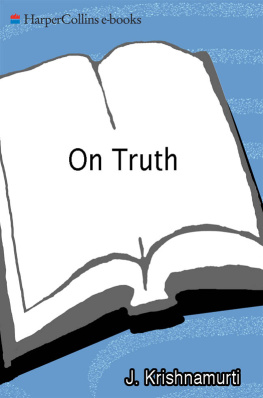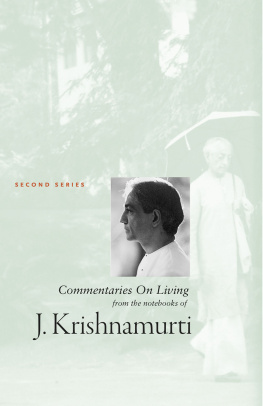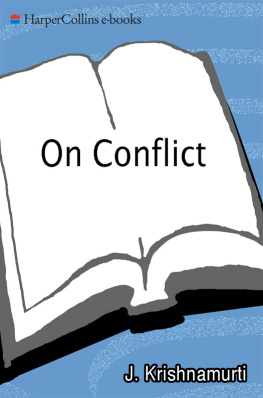Krishnamurti - On Nature and the Environment
Here you can read online Krishnamurti - On Nature and the Environment full text of the book (entire story) in english for free. Download pdf and epub, get meaning, cover and reviews about this ebook. City: San Francisco;Calif, year: 1991, publisher: HarperCollins;HarperSan Francisco, genre: Religion. Description of the work, (preface) as well as reviews are available. Best literature library LitArk.com created for fans of good reading and offers a wide selection of genres:
Romance novel
Science fiction
Adventure
Detective
Science
History
Home and family
Prose
Art
Politics
Computer
Non-fiction
Religion
Business
Children
Humor
Choose a favorite category and find really read worthwhile books. Enjoy immersion in the world of imagination, feel the emotions of the characters or learn something new for yourself, make an fascinating discovery.
- Book:On Nature and the Environment
- Author:
- Publisher:HarperCollins;HarperSan Francisco
- Genre:
- Year:1991
- City:San Francisco;Calif
- Rating:4 / 5
- Favourites:Add to favourites
- Your mark:
- 80
- 1
- 2
- 3
- 4
- 5
On Nature and the Environment: summary, description and annotation
We offer to read an annotation, description, summary or preface (depends on what the author of the book "On Nature and the Environment" wrote himself). If you haven't found the necessary information about the book — write in the comments, we will try to find it.
Spiritual teacher J. Krishnamurti shows that the connection between our inner world of thoughts and emotions is inextricably linked to the outer world of humanity and the environment.
On Nature and the Environment — read online for free the complete book (whole text) full work
Below is the text of the book, divided by pages. System saving the place of the last page read, allows you to conveniently read the book "On Nature and the Environment" online for free, without having to search again every time where you left off. Put a bookmark, and you can go to the page where you finished reading at any time.
Font size:
Interval:
Bookmark:

If you lose touch with nature you lose touch with humanity. If theres no relationship with nature then you become a killer; then you kill baby seals, whales, dolphins, and man, either for gain, for sport, for food, or for knowledge. Then nature is frightened of you, withdrawing its beauty. You may take long walks in the woods or camp in lovely places, but you are a killer and so lose their friendship. You probably are not related to anything, to your wife or your husband.
Krishnamurtis Journal, 4 April 1975
J IDDU K RISHNAMURTI was born in India in 1895 and, at the age of thirteen, taken up by the Theosophical Society, which considered him to be the vehicle for the world teacher whose advent it had been proclaiming. Krishnamurti was soon to emerge as a powerful, uncompromising and unclassifiable teacher, whose talks and writings were not linked to any specific religion and were neither of the East nor the West but for the whole world. Firmly repudiating the messianic image, in 1929 he dramatically dissolved the large and monied organization that had been built around him, and declared truth to be a pathless land, which could not be approached by any formalized religion, philosophy, or sect.
For the rest of his life he insistently rejected the guru-status that others tried to foist upon him. He continued to attract large audiences throughout the world but claimed no authority, wanted no disciples, and spoke always as one individual to another. At the core of his teaching was the realization that fundamental changes in society can be brought about only by a transformation of individual consciousness. The need for self-knowledge and an understanding of the restrictive, separative influences of religious and nationalistic conditionings, was constantly stressed. Krishnamurti pointed always to the urgent need for openness, for that vast space in the brain in which there is unimaginable energy. This seems to have been the wellspring of his own creativity and the key to his catalytic impact on such a wide variety of people.
He continued to speak all over the world until he died in 1986 at the age of ninety. His talks and dialogues, journals and letters have been collected into more than sixty books. From that vast body of teachings this series of theme books has been compiled. Each book in the series focuses on an issue that has particular relevance and urgency in our daily lives.
Questioner: What is the meaning of right relationship with nature?
Krishnamurti: I do not know if you have discovered your relationship with nature. There is no right relationship, there is only the understanding of relationship. Right relationship implies the mere acceptance of a formula, as does right thought. Right thought and right thinking are two different things. Right thought is merely conforming to what is right, what is respectable, whereas right thinking is movement; it is the product of understanding, and understanding is constantly undergoing modification, change. Similarly, there is a difference between right relationship, and understanding our relationship with nature. What is your relationship with nature (nature being the rivers, the trees, the swift-flying birds, the fish in the water, the minerals under the earth, the waterfalls and shallow pools)? What is your relationship to them? Most of us are not aware of that relationship. We never look at a tree, or if we do, it is with a view to using that tree, either to sit in its shade, or to cut it down for lumber. In other words, we look at trees with utilitarian purpose; we never look at a tree without projecting ourselves and utilizing it for our own convenience. We treat the earth and its products in the same way. There is no love of earth, there is only usage of earth. If one really loved the earth, there would be frugality in using the things of the earth. That is, if we were to understand our relationship with the earth, we should be very careful in the use we made of the things of the earth. The understanding of ones relationship with nature is as difficult as understanding ones relationship with ones neighbour, wife, and children. But we have not given a thought to it, we have never sat down to look at the stars, the moon, or the trees. We are too busy with social or political activities. Obviously, these activities are escapes from ourselves, and to worship nature is also an escape from ourselves. We are always using nature, either as an escape or for utilitarian endswe never actually stop and love the earth or the things of the earth. We never enjoy the rich fields, though we utilize them to feed and clothe ourselves. We never like to till the earth with our handswe are ashamed to work with our hands. There is an extraordinary thing that takes place when you work the earth with your hands. But this work is done only by the lower castes; we upper classes are much too important apparently to use our own hands! So, we have lost our relationship with nature.
If once we understood that relationship, its real significance, then we would not divide property into yours and mine; though one might own a piece of land and build a house on it, it would not be mine or yours in the exclusive senseit would be more a means of taking shelter. Because we do not love the earth and the things of the earth but merely utilize them, we are insensitive to the beauty of a waterfall, we have lost the touch of life, we have never sat with our backs against the trunk of a tree. And since we do not love nature, we do not know how to love human beings and animals. Go down the street and watch how the bullocks are treated, their tails all out of shape. You shake your head and say, Very sad. But we have lost the sense of tenderness, that sensitivity, that response to things of beauty, and it is only in the renewal of that sensitivity that we can have understanding of what is true relationship. That sensitivity does not come in the mere hanging of a few pictures, or in painting a tree, or putting a few flowers in your hair; sensitivity comes only when this utilitarian outlook is put aside. It does not mean that you cannot use the earth; but you must use the earth as it is meant to be used. Earth is there to be loved, to be cared for, not to be divided as yours and mine. It is foolish to plant a tree in a compound and call it mine. It is only when one is free of exclusiveness that there is a possibility of having sensitivity, not only to nature, but to human beings and to the ceaseless challenges of life.
W E SEE IN the world about us confusion, misery, and conflicting desires, and, realizing this world chaos, most thoughtful and earnest peoplenot the people who are playing at make believe, but people who are really concernedwill naturally see the importance of thinking out the problem of action. There is mass action and individual action; and mass action has become an abstraction, a convenient escape for the individual. By thinking that this chaos, this misery, this disaster that is constantly arising can somehow be transformed or brought to order by mass action, the individual becomes irresponsible. The mass is surely a fictitious entity; the mass is you and I. It is only when you and I do not understand the relationship of true action that we turn to the abstraction called the massand thereby become irresponsible in our action. For reform in action, we look either to a leader or to organized, collective action, which again is mass action. When we turn to a leader for direction in action, we invariably choose a person we think will help us to go beyond our own problems, our own misery. But, because we choose a leader out of our confusion, the leader himself is also confused. We do not choose a leader unlike ourselves; we cannot. We can only choose a leader who, like ourselves, is confused; therefore, such leaders, such guides and so-called spiritual gurus, invariably lead us to further confusion, to further misery. Since what we choose must be out of our own confusion, when we follow a leader we are only following our own confused self-projection. Therefore, such action, though it may produce an immediate result, invariably leads to further disaster.
Next pageFont size:
Interval:
Bookmark:
Similar books «On Nature and the Environment»
Look at similar books to On Nature and the Environment. We have selected literature similar in name and meaning in the hope of providing readers with more options to find new, interesting, not yet read works.
Discussion, reviews of the book On Nature and the Environment and just readers' own opinions. Leave your comments, write what you think about the work, its meaning or the main characters. Specify what exactly you liked and what you didn't like, and why you think so.











